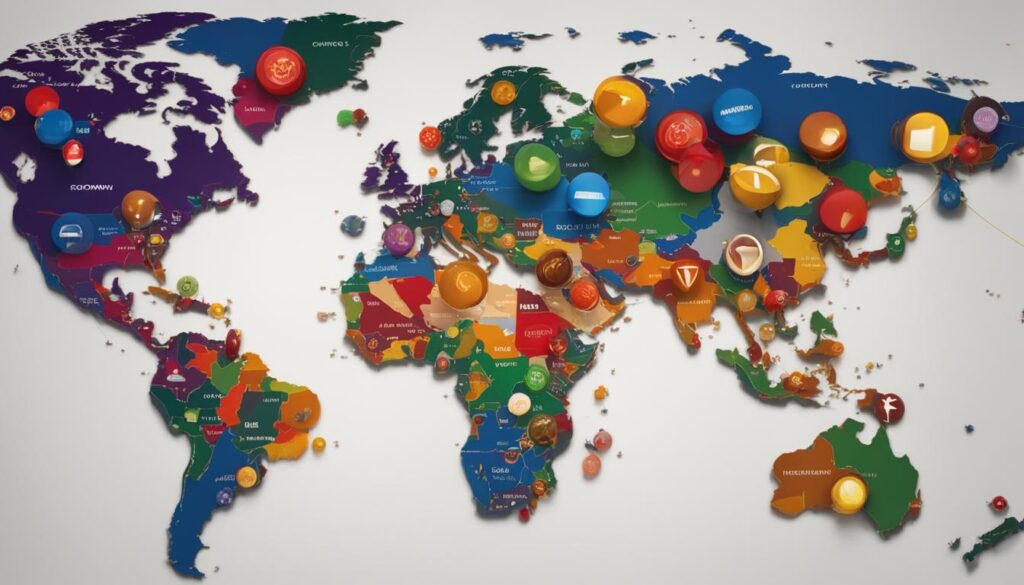We may earn money or products from the companies mentioned in this post.
In today’s globalized world, businesses must adapt their marketing strategies to reach diverse audiences and expand their brand’s visibility worldwide. Multicultural and global marketing approaches are essential for companies looking to succeed in international markets and connect with customers from different cultural backgrounds.
International marketing is not just about translating marketing material into different languages; it’s about understanding the cultural nuances and preferences of consumers. By developing diversity marketing strategies, companies can create more authentic and meaningful connections with multicultural audiences.
Global advertising platforms have made it easier for businesses to expand their reach beyond their domestic markets. However, expanding a brand’s presence globally also presents unique challenges, such as navigating different cultures, languages, and consumer behaviors.
By mastering the art of multicultural and global marketing, businesses can successfully navigate these challenges and unlock new opportunities for growth and expansion.
Key Takeaways:
- Multicultural and global marketing strategies are essential for businesses to reach diverse audiences and expand their brand’s visibility worldwide.
- Developing diversity marketing strategies is not just about translating marketing material into different languages; it’s about understanding cultural nuances and preferences.
- Global advertising platforms provide opportunities for businesses to expand their reach but require companies to navigate different cultures, languages, and consumer behaviors.
Understanding Multicultural Consumer Behavior
Marketing success largely depends on understanding the behavior and preferences of your target audience. This is especially true when it comes to multicultural consumer behavior. With a diverse population in the United States and abroad, it’s essential to develop marketing strategies that resonate with different cultural backgrounds.
Multicultural consumer behavior refers to the actions and decisions of individuals from different cultural groups when purchasing goods or services. Cultural background significantly impacts consumer behavior, including decision-making criteria, shopping habits, and brand loyalty.
The Importance of Diversity Inclusion
Marketing that is welcoming to all cultural backgrounds is known as diversity inclusion marketing. It’s an approach that recognizes and values the differences between people, including race, ethnicity, gender, age, religion, and sexual orientation.
The importance of diversity inclusion in marketing cannot be overstated. Incorporating diverse representation in advertising and marketing materials has a significant impact on how consumers perceive a brand. In fact, a recent study found that 64% of consumers took action after seeing an advertisement they considered to be diverse or inclusive.
Understanding Cultural Differences
One of the keys to developing effective multicultural marketing strategies is to understand cultural differences. This requires research and analysis to gain insights into the unique needs, preferences, and behaviors of different cultural groups.
By understanding cultural differences, marketers can create campaigns that engage with consumers in a meaningful way, promoting trust and long-term brand loyalty.
Addressing Cultural Sensitivities
It’s also essential to address cultural sensitivities in marketing materials. A message that is well-intentioned but culturally insensitive can have a detrimental impact on a brand’s reputation.
Take the time to ensure marketing materials are respectful and inclusive. This includes avoiding stereotypes or insensitive language, using diverse imagery, and being mindful of cultural traditions and holidays.
The Benefits of Multicultural Marketing
The benefits of implementing multicultural marketing strategies are significant. By recognizing and addressing the unique needs of different cultural groups, businesses can expand their customer base, improve brand reputation, and increase revenue.
Moreover, businesses that take the time to develop effective diversity inclusion marketing strategies can position themselves as industry leaders, showing a commitment to social responsibility and inclusivity.
The Power of Multicultural Strategy
In today’s diverse society, implementing multicultural strategies is essential for businesses looking to expand their reach and connect with a variety of audiences. Multicultural strategy involves creating marketing campaigns that are inclusive of different cultures, races, and ethnicities. By doing so, businesses can create a powerful connection with diverse audiences and increase brand loyalty.
One of the key benefits of multicultural strategy is that it allows businesses to tap into a wider range of consumers. According to a report by the U.S. Census Bureau, over 40% of the U.S. population will be made up of minority groups by 2045. This means that to remain competitive, companies must develop marketing strategies that cater to these diverse audiences.
The Importance of Inclusive Marketing
Inclusive marketing is at the heart of multicultural strategy. To effectively implement this approach, businesses must first understand the behaviors and preferences of their target multicultural audience. For example, research has shown that multicultural consumers respond positively to advertising that features people of different backgrounds and ethnicities. By featuring diverse talent in marketing campaigns, businesses can demonstrate a commitment to inclusivity and build stronger connections with their target audience.
Another important aspect of inclusive marketing is language. Studies have shown that consumers are more likely to engage with content that is presented in their native language. Therefore, businesses must consider language preferences when developing marketing campaigns for multicultural audiences. This may involve creating separate campaigns for different languages, or incorporating multiple languages into a single campaign.
The Bottom Line
By embracing multicultural strategy and inclusive marketing, businesses can position themselves for success in an increasingly diverse marketplace. When done correctly, this approach can lead to increased brand awareness, stronger customer relationships, and higher revenue. As businesses continue to expand their reach across different cultures and markets, implementing effective multicultural strategies will become more important than ever before.
Global Branding and Cross-Cultural Marketing
Expanding a brand’s reach across different cultures and markets is a key challenge facing businesses in today’s globalized world. However, with the right global branding and cross-cultural marketing strategies, companies can successfully connect with diverse audiences and increase brand loyalty.
One effective way to approach global branding is through localization. This involves tailoring branding and marketing efforts to specific regions and cultures, using language and imagery that resonates with local audiences. For instance, IKEA has successfully implemented localization by adapting its products and marketing materials to reflect the unique preferences and lifestyles of consumers in different countries. This has helped the company establish a strong global presence while maintaining a localized feel.
Another critical aspect of global branding is consistency. While localization is important, it’s equally vital to ensure that a brand’s core values and messaging remain consistent across all markets. This helps build brand recognition and trust among consumers, regardless of their cultural background.
Examples of Successful Global Branding
Coca-Cola: One of the most recognizable brands in the world, Coca-Cola has successfully established a consistent brand identity across diverse cultures and markets. While the company adapts its marketing efforts to reflect local customs and traditions, its core messaging remains the same: happiness and togetherness.
Apple: Apple is another example of a brand that has successfully developed a strong global identity. The company’s sleek, minimalist design aesthetic and focus on innovation have resonated with consumers worldwide, helping it become a leader in the global technology market.
Cross-cultural marketing is another important aspect of expanding a brand’s reach across borders. This involves developing marketing campaigns that appeal to consumers from diverse cultural backgrounds, while also respecting their unique values and beliefs. An excellent example of cross-cultural marketing is McDonald’s, which offers localized menus featuring regional favorites in different countries while maintaining a consistent brand image.
The Power of Cross-Cultural Marketing
Cross-cultural marketing can help companies build trust and credibility with consumers from different cultures, ultimately leading to increased brand loyalty and sales. This approach requires a deep understanding of the values and preferences of diverse communities, as well as a willingness to adapt marketing strategies to reflect these differences.
| Benefits of Cross-Cultural Marketing | Challenges of Cross-Cultural Marketing |
|---|---|
| Increased brand awareness and recognition among diverse audiences | Difficulties in navigating cultural differences and sensitivities |
| Opportunities to tap into new markets and expand customer base | Language barriers and translation issues |
| Greater potential for building long-term relationships with customers | Costs associated with developing localized marketing materials |
By taking advantage of the benefits of cross-cultural marketing and addressing the associated challenges, businesses can successfully navigate global markets and drive growth worldwide.
Effective International Marketing Tactics
In today’s globalized world, international marketing has become a crucial aspect of expanding businesses. However, marketing strategies that work in one country may not necessarily be effective in another due to cultural differences and language barriers.
Adapting marketing strategies to local cultures and languages is essential to successfully penetrate new markets. This involves researching the target market, understanding local customs, and tailoring marketing messages to fit the cultural context.
Social Media Advertising
Social media advertising is a cost-effective way to reach a global audience. With platforms like Facebook, Twitter, and Instagram, businesses can create targeted campaigns based on demographics, interests, and behaviors.
When it comes to advertising on social media, it’s crucial to consider the cultural nuances of the target audience. For instance, humor that works in one country may not be appreciated in another. Therefore, it’s important to create content that resonates with the local audience while also maintaining the brand’s identity.
Localization
Localization refers to the process of adapting products or services to meet the language, cultural, and other specific requirements of a particular country or region. This involves translating marketing materials, website content, and product descriptions into the local language.
Localization is particularly important when expanding into countries with non-English speaking populations. It shows respect for local culture and helps build trust with potential customers. It also ensures that marketing messages are clear and comprehensible, which can lead to higher conversion rates.
Global Advertising Platforms
Global advertising platforms like Google Ads and Bing Ads allow businesses to target audiences in multiple countries using a single platform. These platforms offer features such as language targeting and location targeting to ensure that ads are seen by the right audience.
When using global advertising platforms, it’s important to consider the language and cultural differences of the target audience. Ad copy should be translated accurately, and images and visuals should be culturally appropriate to avoid offending potential customers.
Effective international marketing requires a deep understanding of local cultures, languages, and consumer behavior. By adapting marketing strategies to meet the needs of different markets and utilizing global advertising platforms, businesses can successfully expand their reach and drive growth on a global scale.
Conclusion
In today’s globalized world, multicultural and global marketing strategies have become essential for businesses that aim to expand their reach and appeal to diverse audiences. By understanding the behaviors and preferences of multicultural consumers and developing inclusive marketing approaches, businesses can create a stronger connection with their target audiences and increase brand loyalty.
Implementing effective international marketing tactics is crucial for businesses that seek to navigate global markets and drive growth worldwide. Adapting marketing strategies to local cultures and languages, as well as utilizing global advertising platforms, can help businesses reach their target audiences more effectively.
Global branding and cross-cultural marketing come with both challenges and opportunities. However, businesses that can successfully expand their brand’s reach across different cultures and markets can reap the benefits of increased visibility and revenue.
In conclusion, integrating multicultural and global marketing strategies into business operations can create a significant impact on brand visibility and growth. By utilizing these approaches, businesses can successfully navigate global markets and create a lasting connection with their diverse audiences.
FAQ
What are multicultural and global marketing strategies?
Multicultural and global marketing strategies are approaches used by businesses to target diverse audiences across different cultures and markets. These strategies involve understanding and incorporating cultural nuances, languages, and preferences to effectively reach and engage with consumers worldwide.
Why are multicultural and global marketing strategies important?
Multicultural and global marketing strategies are important because they allow businesses to tap into the growing demographic diversity around the world. By adopting these strategies, companies can tailor their marketing efforts to resonate with different cultural backgrounds, expand their brand visibility, and drive growth in global markets.
What is multicultural consumer behavior?
Multicultural consumer behavior refers to the behaviors, preferences, and purchasing patterns of individuals from different cultural backgrounds. Understanding multicultural consumer behavior is essential for businesses to develop marketing strategies that effectively resonate with diverse audiences and promote inclusivity.
How can multicultural strategies benefit businesses?
Multicultural strategies can benefit businesses in several ways. These strategies allow companies to establish stronger connections with diverse audiences, build brand loyalty, and tap into new markets. By embracing inclusivity and diversity, businesses can create a competitive edge and foster a positive brand image.
What is global branding and cross-cultural marketing?
Global branding refers to the process of creating a consistent brand image and message across different countries and cultures. Cross-cultural marketing, on the other hand, involves adapting marketing strategies to effectively communicate with consumers from various cultural backgrounds. Both global branding and cross-cultural marketing are crucial for expanding a brand’s reach in international markets.
What are effective international marketing tactics?
Effective international marketing tactics involve adapting marketing strategies to suit local cultures and languages. This includes conducting market research, localizing content, and utilizing global advertising platforms to reach international audiences. By tailoring marketing efforts to specific markets, businesses can effectively engage consumers and drive successful international campaigns.
What is the significance of multicultural and global marketing strategies?
Multicultural and global marketing strategies are significant in today’s globalized world because they allow businesses to connect with diverse audiences, increase brand visibility, and drive growth in international markets. These strategies enable companies to embrace diversity, foster inclusivity, and create long-lasting connections with consumers around the world.
Affiliate Disclosure: This post may contain affiliate links. If you purchase through our link, we may receive a small commission, but at no additional cost to you. For more information, please see our Disclosure statement.



